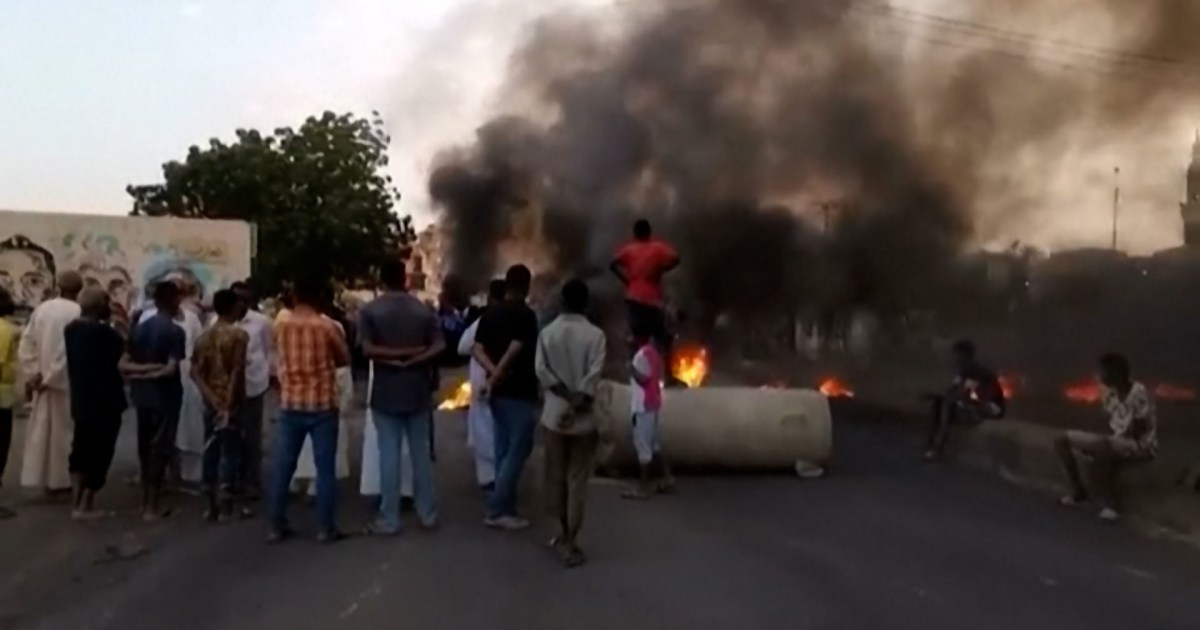On December 19, 2018, hundreds of Sudanese demonstrated, in the cities of Atbara, Port Sudan, and Al Nahud, against the government's decision to triple the price of bread in the midst of an economic crisis.
The demonstrations expanded a day later to other areas, including Khartoum and Omdurman.
On the sixth of April 2019, a sit-in began in which thousands of Sudanese participated in front of the army headquarters in Khartoum.
On April 11, 2019, the Sudanese army overthrew and arrested al-Bashir, three decades after he came to power following the 1989 coup backed by Islamists.
The following are the most prominent stations that Sudan has gone through since the overthrow of Al-Bashir:
Military council and bloody repression
A transitional military council was formed in the country, but the demonstrators continued their sit-in and denounced a "coup".
On June 3, 2018, armed men in military uniforms brutally dispersed the sit-in in front of the army headquarters, killing dozens.
An army-ordered investigation found that members of the paramilitary Rapid Support Forces were implicated in the bloodshed.
In all, 250 people were killed during the suppression of the protests, according to a committee of doctors close to the demonstrators.
transition period agreement
On July 17, 2018, Sudan's protest leaders and the ruling military council initialed the "Political Declaration" that establishes the principle of power-sharing during a 3-year transitional period.
The declaration provides for the establishment of a "sovereignty council" to manage the transitional period.
After the mid-August 2019 negotiations, the Sovereignty Council was formed, which included 6 civilians and 5 military personnel, headed by Lieutenant-General Abdel Fattah Al-Burhan.
Abdallah Hamdok, a former UN economist, was appointed prime minister.
The new authority placed on top of its priorities the establishment of peace in the country that is witnessing a conflict with the rebels in Darfur (west) and in the states of Blue Nile and South Kordofan, which resulted in the killing of thousands.
At the end of November 2019, the party of the ousted president was dissolved and his regime was “dismantled”.
Bashir's conviction
On December 14, 2019, al-Bashir was sentenced to two years in a “Social Reform House” after being convicted of corruption in one of several cases against him.
On the 22nd of the same month, the judicial authorities opened an investigation into the crimes committed in the Darfur region since 2003 against Al-Bashir, who has been wanted for more than a decade by the International Criminal Court on charges of "genocide", "war crimes" and "crimes against humanity".
Al-Bashir is being tried in a separate case over the military coup that brought him to power.
peace agreement
On June 30, 2020, tens of thousands demonstrated in Khartoum and other cities to demand the implementation of the reforms they had called for during the uprising.
The demonstrators demanded that those responsible for the repression be held accountable.
On August 17, 2020, about 3,000 people demonstrated in the capital to express their disappointment following the signing of the political transition agreement.
On October 3, 2020, the Sudanese government signed a historic peace agreement in Juba with an alliance of 5 rebel groups and 4 political movements, from the Darfur region (west) and the states of Blue Nile and South Kordofan, supposed to put an end to the bloody conflict that lasted 17 years.
Economic emergency
On September 11, 2020, the government declared an "economic emergency" to contain the pound's collapse against the dollar and curb hyperinflation.
Sudan is facing a stifling economic crisis as a result of decades of disastrous management.
Normalization with Israel
On October 23, 2020, the agreement to normalize relations between Sudan and Israel was announced.
Thus, Sudan became the fifth Arab country to establish relations with Israel, after Egypt, Jordan, the UAE and Bahrain.
As with the UAE and Bahrain, Sudanese-Israeli normalization was sponsored by the administration of former US President Donald Trump.
Removing Sudan from the blacklist
On December 14, 2020, the United States formally removed Sudan from its blacklist of state sponsors of terrorism.
fragile situation
On February 8, 2021, the Prime Minister unveiled a new government that includes 7 ministers from rebel groups that were active under the previous regime.
On June 22, 2021, Abdallah Hamdok called for unity between politicians and the military, warning of “extremely worrisome” divisions.
Failed attempt, coup
On September 17, 2021, protesters closed the country's main port in Port Sudan (east).
On September 21, 2021, Khartoum announced that it had thwarted a coup attempt by civilians and military, accusing them of being linked to the Bashir regime.
On October 15, 2021, Abdallah Hamdok considered the transition to be going through the “worst crisis.”
On October 16, 2021, army loyalists set up tents in front of the presidential palace, where the transitional authorities are based, in order to demand a military government.
On October 21, 2021, major demonstrations were held in support of a civilian government, in response to the actions of army loyalists.
On October 25, 2021, the military arrested government officials and politicians in Sudan, led by Prime Minister Abdalla Hamdok, which the most prominent group calling for the handover of power to civilians described as a "coup."

